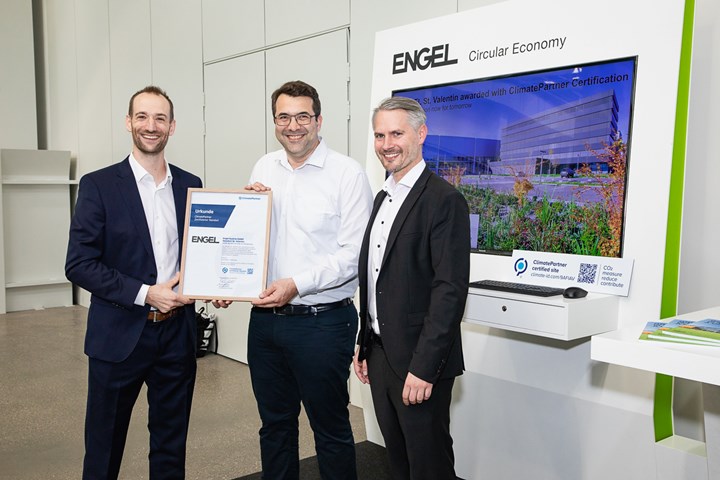Engel Aims for Net Zero Emissions, Commits to Standard
The Austrian-based maker of automation and injection molding machines will subject its CO2 reduction targets to the Science Based Targets Initiative (SBTi) and it achieved ClimatePartner status.
Engel (Schwertberg, Austria) has set science-based reduction targets to achieve net zero greenhouse gas emissions at its production facilities, subjecting them to a review under the Science Based Targets Initiative (SBTi). Engel noted that SBTi’s defined targets will help satisfy the requirements of the Paris Climate Agreement.
Currently, Engel uses 100% “green” electricity in all its Austrian plants, including a growing proportion generated by its own photovoltaic systems. In a press release, Engel CEO Stefan Engleder noted that for this fiscal year, the company has budgeted euro 10 million for the expansion of its renewable energy production. In addition to that, Engel notes that it offers molders proprietary technologies to process recycled plastic waste. Last year, Engel improved its sustainability ranking from the global environmental consultancy Eco Vadis from silver to gold status.
Engel is reducing all Scope 1 and Scope 2 emissions by 50% and Scope 3 emissions by 42% by 2030 compared with 2022. Scope 1 emissions are those that a company owns or controls directly. Scope 2 emissions are ones that a company causes indirectly and those that come from the energy it uses and how it’s produced. Scope 3 emissions aren’t directly produced by a company, but are ones it is indirectly responsible for across its value chain.
In addition, Engel announced that its St. Valentin large-machine plant in Austria was recognized as a ClimatePartner certified production plant. Following a successful audit, production plants receive this seal by calculating their emissions; naming CO2 reduction targets; implementing reduction measures; supporting climate protection projects; and communicating transparently.
Engel notes that the successful certification was due in part to conversion of heat generation to biomass, pushing the company “very close” to net zero direct emissions for St. Valentin.

From left: Jakob Sterlich, general manager, ClimatePartner Austria; Martin Weger, plant manager Engel St. Valentin; and Alexander Hell, global head of sustainability at Engel receive the ClimatePartner Certificate.
Photo Credit: Engel
Related Content
-
Film Extrusion: Boost Mechanical Properties and Rate of Composting by Blending Amorphous PHA into PLA
A unique amorphous PHA has been shown to enhance the mechanical performance and accelerate the biodegradation of other compostable polymers PLA in blown film.
-
Processing Megatrends Drive New Product Developments at NPE2024
It’s all about sustainability and the circular economy, and it will be on display in Orlando across all the major processes. But there will be plenty to see in automation, AI and machine learning as well.
-
Inside the Florida Recycler Taking on NPE’s 100% Scrap Reuse Goal
Hundreds of tons of demonstration products will be created this week. Commercial Plastics Recycling is striving to recycle ALL of it.





